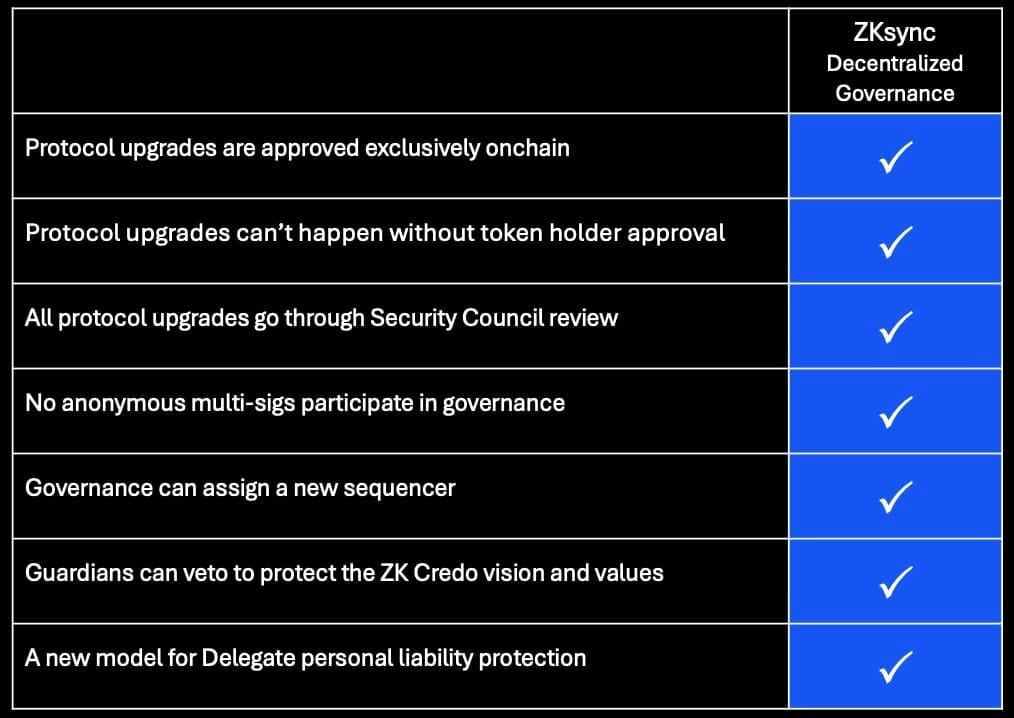The ZKsync governance system is now live. This post explains what governance is, how it works, and outlines the principles and choices embedded in it.
ZKsync Governance Design Philosophy – Resilient, Distributed and Mission-Aligned
ZKsync’s true onchain governance embodies the core attributes of resilience, distribution, and mission alignment. These attributes reinforce the values of the ZK Credo–the right to fork or exit, and the community’s ability to verify decisions and actions trustlessly.
- Resilient: ZKsync's governance system is built to last. The system includes multiple built-in safeguards, autonomously enforced onchain, to address risks and keep things running smoothly on the blockchain. Even if a governing body or its members become adversarial, they cannot unilaterally prevent the protocol from continuing to evolve.
- Mission-Aligned: ZKsync is anchored on the vision and principles articulated in the ZK Credo. Everyone involved in governance, no matter which body they belong to, is expected to act in accordance with these shared values and responsibilities, and the governance mechanisms contain a set of checks and balances to enforce this.
- Distributed: ZKsync’s governance is spread out across multiple blockchain-based bodies and includes various Ethereum communities from all corners of the globe. This setup was designed to ensure a healthy balance of power and to prevent any single group from having too much control.
Unique Characteristics of the ZKsync Governance System

Three-Body Governance
The ZKsync governance system is designed around the principles of separation of powers and checks and balances. By design, there is not a single person or entity has the power to make changes to the ZKsync protocol. All changes to the protocol must be approved by three independent bodies, who exercise independent judgment and control over their decisions: the token holder community, a group of security experts, and a group of high-profile, values-aligned individuals who ensure that proposals align with ZKsync values.
The three bodies in the ZKsync governance system are the Token Assembly, Security Council, and Guardians. Each plays a vital role in ensuring durable, distributed, and mission-aligned governance.
Two of these entities, the Security Council and Guardians, use an innovative structure that combines smart contracts and legal entities. These entities, sometimes referred to as “BORGs” (or Blockchain Organizations), are legally governed by smart contracts through tech-specific rules embedded in their charter documents. The actions of their members are bound by strict service level agreements and ethical guidelines to ensure prompt, unbiased, and effective decision-making in the best interest of the ZKsync community.
1) ZKsync Token Assembly
The ZKsync Token Assembly includes token holders who delegate their voting power and Delegates who receive this voting power. Unlike token governance organizations that only allow holders to vote on grants from their treasury, the Token Assembly is also empowered to submit and vote on proposals to upgrade the protocol, token, and governance systems.
This is perhaps the most important facet of the system: token holders and their Delegates can initiate ordinary upgrades to the ZKsync protocol directly onchain, instead of relying on a single multisig. Once a proposal has been submitted for a vote, the process then involves two other entirely independent groups.
This is true onchain governance, the standard every protocol should aspire to meet.
Another innovation in the approach to the Token Assembly relates to legal protection for Delegates. Prior to submitting a proposal or voting through the canonical governance portal, every Delegate can opt in to become a member of the ZKsync Association, an ownerless, non-profit association. This is a new model to address potential personal legal liability of Delegates for decisions made in connection with the Token Assembly.
2) ZKsync Security Council
The ZKsync Security Council is a group of highly technical and skilled engineers, security auditors, and security professionals who safeguard the ZKsync protocol and network technical security. The body is contracted to review and actively approve protocol upgrades approved by the Token Assembly and, in response to imminent or active security threats, has the power to freeze the protocol and submit necessary time-sensitive upgrades.
Their power is constrained: they cannot unilaterally submit and approve upgrades. Even emergency proposals require the approval of the Guardians, described in the next section, and a third reviewer. At present, the newly formed ZKsync Foundation will serve as the third reviewer.
3) ZKsync Guardians
The ZKsync Guardians ensure that ZKsync governance proposals are consistent with the values of the ZK Credo. Their primary power is exercising their veto on proposals. Functionally, this means the Guardians act as a check on the other participants in the governance system to ensure alignment and protect the protocol. Such a check can also be useful in curbing governance attacks against the protocol that would seek to manipulate the protocol or token for individual gain.
It includes individuals from around the world who each have deep commitments and connections to the project and live and breathe cypherpunk values.
ZKsync Governance Proposals
The three bodies of the ZKsync governance system—the Token Assembly, Security Council, and Guardians—come together to publish, approve, and execute three types of proposals: ZKsync Improvements, Token Programs, and Governance Advisory. The Token Assembly can submit proposals and approve them (or reject them). All proposals can then be vetoed by the Guardians, and protocol upgrades require Security Council approval. In short, there is no single person or group of persons has the power to unilaterally propose and approve proposals.
ZKsync Improvement Proposals (ZIPs): This includes all regularly scheduled protocol upgrades. ZIPs can be proposed by Delegates and must be actively approved by the Security Council, or, if the Security Council is unavailable due to exceptional circumstances, by the Guardians.
Token Program Proposals (TPPs): Delegates are invited to submit Token Programs to be approved by the Token Assembly. If approved (meaning that it has successfully passed a review by the Guardians), Token Programs assign minting and burning rights of ZK tokens, activating new mechanics for the ZK token. All Token Program Proposals (“TPPs”) must be aligned with the Token Program Guidelines, and help achieve the goals supporting the vision of the ZK Credo.
Governance Advisory Proposals (GAPs): The Governance Operations Governor manages governance related to offchain operations unrelated to protocol upgrades or token programs. These activities could include ratifying the ZK Credo or nominating new Security Council members. Since outcomes are recorded onchain, the GovOps governor vote results may be connected to other contracts built by the ZKsync community. For instance, a DeFi project could make a key parameter (interest rates or fees) directly subject to control by the GovOps governor. Again, as with ZIPs and TPPs, GAPs are subject to review and veto by the Guardians.
A Community-Powered Future
This is the culmination of years of collaborative effort from a global community of contributors, embodying the decentralized ethos the crypto community aspires to.
ZKsync governance is more than just onchain contracts governing the ZKsync protocol. Like the protocol itself, it is a journey of intentional innovation for real-world impact. All members of the ZKsync community are invited to engage with this new structure and help shape the future of the network by participating in discussions on the ZK Nation Forum.

